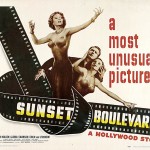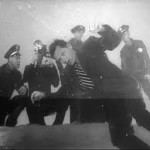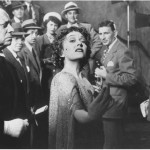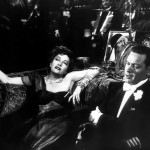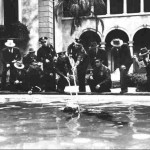“I AM big. It’s the pictures that got small.”
To quote my micro-review from my Top 20 Movies:
Sunset Boulevard: Film noir meets the last remnants of the silent era. Gloria Swanson’s dying Salome, Erich von Stroheim’s eerie butler and William Holden’s naive-yet-streetwise penniless writer combine to create an illusion of grandeur, before Holden meets his match. De Mille looks on… sending himself up.
In fact, you could say Sunset Boulevard (in practice not such an enigmatic piece of road these days) is a bitter and twisted Hollywood sending itself up in a very knowing fashion, and all the more appropriate that it is Billy Wilder doing the sending up. In short, Hollywood pulled out all the stops to comment on the grimy flipside to its own glitz and glamour in the style of classic film noir.
The casting says everything you need to know about the satirical roots of what appears at face value a noirish thriller: Gloria Swanson sending herself up as the vampish ex-silent star of the screen, Norma Desmond; Erich von Stroheim, silent movie director, as the butler, Desmond’s first director and first husband; Cecil B DeMille, Buster Keaton, Hedda Hopper, Anna Q Nilsson, H B Warner and others from the pre-sound era playing themselves; and as the naive screenwriter Joe Gillis, allowing himself to be exploited as Desmond’s plaything, none other than William Holden, the irony being that this was Holden’s breakthrough movie, for which he earned an Oscar nomination.
As such, there is not much to tell beyond that, other than that this movie is essentially a three-hander, a psychological drama in which the key players are a faded and delusional movie star, the ever-devoted butler who turns out to have been her first husband, and Holden’s penniless screenwriter who suffers a blowout while evading bailiffs trying to repossess his car.
By chance he crawls into the faded grandeur of a Hollywood mansion and meets Norma Desmond and finds himself mistaken for the funeral director with the coffin for her dear departed chimp. That’s when he problems truly start: being dressed like a millionaire and paraded around in an ancient limo has its attractions but is not what Gillis truly wants or needs, and therein lies his downfall. Ultimately he wants the girl, and creeping out at night to meet her and co-write the script that might just lead to his regaining independence does not go unnoticed.
For all the satire here, Sunset Boulevard is a creepy movie. The claustrophobic tension in the drama comes as the power balance between the three main players shifts, and the inevitable outcome is the narrator Gillis telling of his own demise, face down in the swimming pool, two slugs in his back and one in the front (though incredibly he didn’t bleed!) What an iconic shot though – up through the water towards the press crowding on the edge.
Poor guy – Gillis didn’t read the runes. He failed to understand that rejecting Desmond would be one ignominy the faded star could not face, despite being in terminal denial about her forgotten career. Not like she didn’t give him due notice with fits of hissy jealousy and even a suicide bid when his nightly scriptwriting excursions with Betty Shaefer (Nancy Olson) are misread. In fact, he has to confront her with the fact that he is a kept man, a toy boy with his 18 hand made suits and dozens of bespoke shirts. He enjoys the style and the money but hates being confined – and the yearning to regain his independence is ultimately the cause of Gillis’s death.
If nothing else his exit gives Desmond her moment of shining glory as the (news) cameras roll, her final scene as Salome with the press looking on… but no Mr DeMille to film her entrance. It’s the creepiest scene of all, one that makes the hairs on the back of my neck stand on end, a scene that says much about how we all refuse to let go when we should move on. The ego, the self-aggrandisement, the illusions, they are all that remain.
I know there is now a stage musical version, and while I’ve not seen it that does sound like sacrilege. If you want to understand the story, go back to source, then research the big stars from the silent era after the emergence of the talkie. This is a finely-honed movie, with emotions as fresh and raw as the day they were crafted, in spite of the sardonic narration.


